Nerys writes: The other day I accidentally broke the handle of my favourite mug as I was doing the washing up. How ironic I thought, breaking my beloved cup during a week when I was reflecting on readings which are all about dealing with our struggle to live well with our brokenness.
The children of Israel had grumbled and bickered in the wilderness for forty years. Even now, after they had been given God’s Law, and the Promised Land was in sight, they continued to be fractious, causing Moses in his final words to them to set out a stark choice between good and evil. life and death. ‘Love God’, he urges them in Deuteronomy 30.15-20. ‘Walk in God’s ways. Keep God’s Law so that you will live and be blessed by God, otherwise you will be cursed and you will die.’
When Jesus came, nothing had changed. His people were as dysfunctional as ever. As he delivers his new interpretation of God’s Law to his disciples, his uncomfortable teaching in Matthew 5.21-37, connects everyday thoughts and feelings with actions which can destroy lives, families, communities. Human brokenness often leads to broken relationships, sometimes with catastrophic results: lack of trust can lead to litigation, lustful feelings can lead to adultery, angry thoughts can lead to murder.
Jesus came to fulfil the Law, bringing freedom to those ready to follow him. But in 1 Corinthians 3.1-9, we see that even within the Church, nothing had changed. The Christians of Corinth were at loggerheads, their community riven by jealousy and quarrelling, causing Paul to speak to them like children rather than mature believers.
Two thousand years later, nothing has changed. Today, Racial Justice Sunday marks 30 years since the death of Stephen Laurence as the result of an unprovoked racist attack in London. Since his murder, at least another 96 young people have died in similar attacks in Britain. In our society, nothing has changed. We continue to live in communities fractured by prejudice and hate. We live within broken social systems, led by broken people, and the Church is no exception to this.
In our culture we tend to throw broken thing away, however precious they have been to us. In Japan though, there is an ancient art called Kintsugi. The word means ‘to repair with gold’. Broken pottery is put together again and a lacquer mixed with gold, silver or platinum is used to fill in the cracks. The restored vessel is considered to be even more beautiful, more valuable and stronger for having been broken.

I haven’t done any golden repairs on my mug, but I have been reflecting this week on the way God cherishes me despite my brokenness, despite the cracks, bruises and scars which sometimes cause me to hurt others.
Rather than tossing people aside because they are damaged, God pulls them closer and restores them. During their long years in the wilderness, Jehovah Rapha, ‘the God who heals’ had ministered to the broken people of Israel. When Jesus came, he gravitated towards those in need and mended them. physically and spiritually. Today, just as the shimmery gold binds the broken pottery giving it beauty and new worth, Christ continues to heal the broken-hearted, binding up their wounds and making them new again. Christ redeems our lives. When we live in Christ who is Love, his strength and his beauty shine through our cracks enabling us to bring about healing in others.
Baptism reminds us of all of this. When we renew our baptism promises, we acknowledge our brokenness and turn to Christ. We make the choice Moses is talking about. We express our decision to renounce evil, to repent of sin, to follow Christ. We choose life. We do this, not in our own strength but standing with Christ. And again, when we express our commitment to live the Christian life following God’s call, we do so, not in our own power but in the power of Christ. As Paul pointed out in his letter, God is the one who gives spiritual growth. We make our promises acknowledging that we’re completely dependent on the help of God to fulfil them.
At baptism we become ‘co-workers in God’s service’, part of God’s Church, a community of broken people who are in regular need of restoration. Together we are Christ’s body, a broken, wounded body through which God’s Spirit works, bringing healing, hope and joy to the world. When we wonder who we really are or doubt that our lives are worth much, when we see only our limitations and dwell on our failures, when we struggle with self-destructive habits, baptism reminds us of who God has called us to be.
On the internet you can find many sayings attributed to famous people which they almost certainly never uttered or wrote. Among these is the claim that Martin Luther said, ‘Every day when you wash your face you should remember your baptism’. This doesn’t really match the reality of 16th century hygiene when daily washing wasn’t practised, but it does chime with Luther’s thinking about the central place of baptism in the life of the Christian. Here are some things that Luther really said:
Baptism is not a work that we do but … a treasure that God gives us and faith grasps.
In baptism, therefore, every Christian has enough to study and practice all his or her life.
Thus, we must regard baptism and put it to use in such a way that we may draw strength and comfort from it when our sins or conscience oppress us, and say: ‘But I am baptized!’
This week we pray in particular for all those who have been affected by the earthquakes in Turkey and Syria as we look for ways to work together to help mend lives and communities broken by the disaster.
Almighty and everliving God, whose Son Jesus Christ healed the sick and restored them to wholeness of life, look with compassion on the anguish of the world, and by your power make whole all peoples and nations; through Jesus Christ our Lord, who lives and reigns with you and the Holy Spirit, one God, now and for ever. Amen
Rachael writes: Jesus wasn’t baptised as a baby in the same way that many of us were. As was the law in Judaism, he was taken to the temple to be presented to God forty days after his birth. Mary and Joseph went with the offering designated for people who were poor, who couldn’t afford a whole lamb, but could take a pair of turtle doves or two young pigeons, to “redeem” Jesus having offered him like all first born males, human and animal had to be.
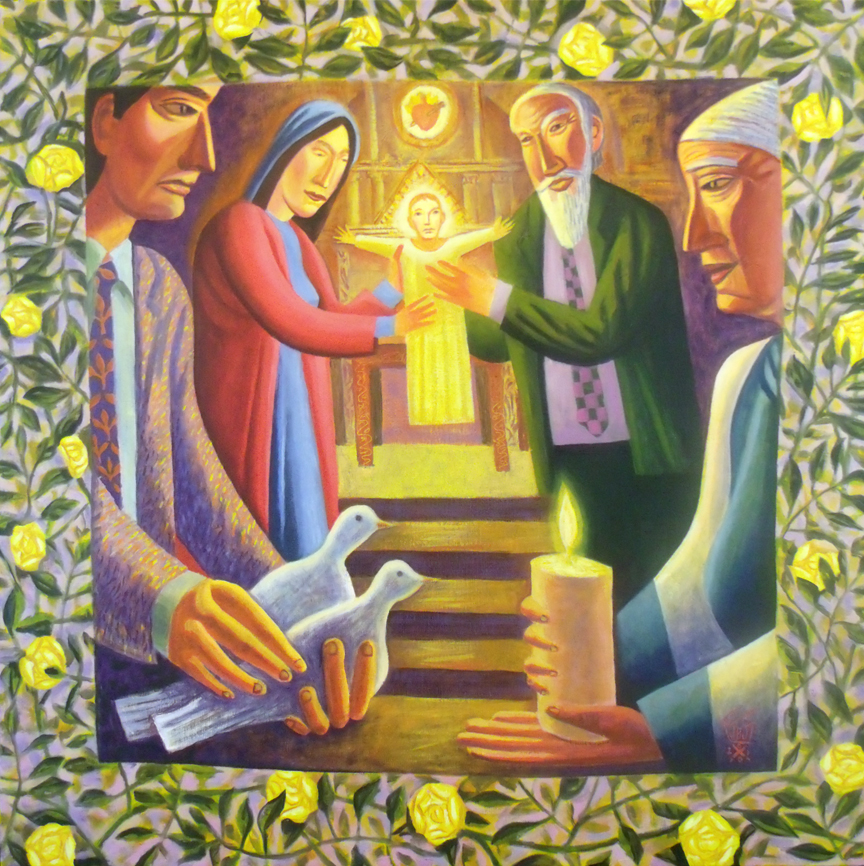 James B. Janknegt We see something of this presentation at the temple, this offering of Jesus to God for God’s work and will, in baptism today. Parents bring their children to church to present them to God, or adults present themselves. It’s a way of saying to God, “I want my child, or I choose for myself, to follow you God. To live your way and to share your love with the world”.
When they were there, Mary, Joseph, and Jesus, met a man called Simeon. He was full of the Holy Spirit, full of God, and God led him to the temple where he took the baby Jesus in his arms and declared Jesus to be “a light for revelation”. It doesn’t mean that Jesus glowed like a lightbulb but that he was revealing to the world the truth of who God is and what the world is like. He was showing the reality of our human situation and of God’s love and transformative work.
Anna also realised how important this baby was. She recognised that Jesus was going to change everything, that he was going to help her people to know God more, and make the world more like God intended. She was so in awe, so amazed, and so excited, that she couldn’t hold back.
I think most of us will be able to remember a time when we’ve been stuck in the darkness and desperate for just some light to show us the way. Maybe we woke up in the middle of the night and as our eyes adjust we realised that the light of the moon was peeping round the curtains just enough to light the way. Or perhaps it was more a darkness within us – a fear or anxiety – and it was the kind words of a friend, or the smile of a stranger that gave us hope in the midst of it. It doesn’t take much. Even a small, flickering candle flame can illuminate a great big space. When we’re in the presence of such a light, there’s no avoiding our being lit up by it too.
Mary and Joseph had come to offer Jesus to God but Simeon and Anna ended up offering themselves to Jesus. Their worlds were lit up by him as he banished the darkness for them, showing them the way and guiding them on. They were changed by their encounter with him and couldn’t help but tell everyone about it.
Jesus’ light has never gone out. It still shines brightly today drawing us in like it did for Simeon and Anna. And we offer ourselves to him, like they did, at baptism but also every day when we choose to follow him. We are illuminated by him and sent out into the world to shine. To shine with his truth and love and transformation.
That’s why we give people candles when they are baptised. To remind them that they carry Christ’s light with them into all the world. And at the end of our service in church today, we’ll remember that again as we light our candles and give thanks for Christ’s light in our lives. Then we’ll extinguish them and remember that the light of Christ is within us now and we go to share it with the world.
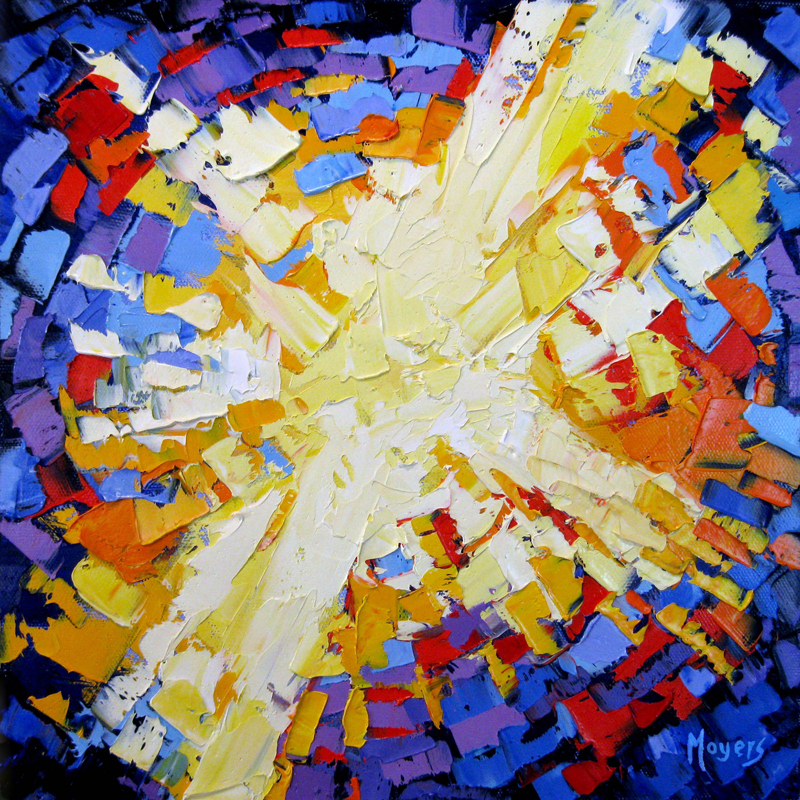 Mike Moyers, “Awake My Soul” When has Christ’s light illuminated your life? Where can you shine Christ’s light today?
I’d encourage you at home, if you’re safely able, to light a candle and offer these prayers:
Like Simeon, may I grow old in hope and wonder.
Like Anna, may I be in love with you all my days.
May I be open to truth, open to surprises.
May I let your spirit into my life.
May I let your justice change my behaviour.
May I live in the brightness of your joy.
Starmaker God, Lightner of the world,
bless us and warm us into the light of loving.
Bring us to the light of Jesus all the length and breadth of our nights and days.
As the candle, so my life:
flickering, burning, changing, alight and warm with the light which is you.
Amen. (by Ruth Burgess)
We remember the place of our new birth at baptism
Let us shine with the light of your love.
We turn from the crib to the cross.
Let us shine with the light of your love.
We go to carry his light.
Let us shine with the light of your love.
Thanks be to God.
Amen

Peter writes “Atishoo, atishoo, we all fall down” – This nursery rhyme probably dates back to the Great Plague of the 1660s, when sudden sneezing was considered the first symptoms of the disease and soon its victims would all fall down. And so, to this day, we still say “Bless you” when someone sneezes. But what do we mean when we say that? What did Jesus mean when he invoked the blessings that we call the Beatitudes?
Here, Jesus is following a form of Jewish prayers which is still used in synagogues and in homes today. Often they consist of blessings addressed to God, for instance before meals praising him for his goodness and generosity in providing for our needs. There are many similar prayers for other occasions. On getting dressed a pious Jew might say “Blessed is he who clothes the naked”.
We may also ask God to bless people or things, asking him to bestow his grace or show them his favour and protection, hence “Bless you” when we sneeze. At Epiphany, Rachel encouraged us to write an inscription above our front doors containing the letters CMB. These are the initials of the Three Wise Men (Caspar, Melchior, Balthazar) but they also stand for Christus mansionem benedicat – “May Christ bless this house”. That is, we are asking that his love and favour may dwell there and be felt by all who enter.
In asking God to bless things we are also expressing the intention that they are to be set aside for holy purposes. Before the Eucharistic Prayer, the priest may use a prayer to bless our offering of bread and wine and in the prayer itself we recall that Jesus blessed the bread and wine at the Last Supper. Similarly we ask God to bless the water in the font at baptism. In this way ordinary water becomes special, just as we come before him as ordinary people but made special through God’s blessing and called do some special task for him that only we can do. It may be a lifelong commitment or it may be a case of being in the right place at the right time. As St John Henry Newman wrote, we may never know in this life what that task is.
This brings me to the people that Jesus calls blessed in the Beatitudes. They come at the beginning of his earthly ministry and in a sense they set out his agenda. Those who are blessed are ordinary people, leading lives, full of God’s favour and protection, but who would not be considered blessed in the eyes of the world. What we need to look for, he says, is people’s character, finding contentment in simple things; longing for justice; indignant at the neglect of God’s will and not harbouring grudges or seeking revenge.
Blessedness is to be found in the topsy-turvy nature of the kingdom of heaven, where the first shall be last, the last first and where the judgements and attitudes of the world all fall down.
For prayer and meditation
“Praise God from whom all blessings flow. Praise him all creatures here below.” – To praise him is another way of blessing him. What other words come to mind when you think of blessing?
“Count your blessings”: – Spend a few moments to consider how you have been blessed in the past and are today. Thank God for them.
Look at the types of people Jesus calls blessed. Do any of them apply to you and what form did or does the blessing take? Do you need to work at any of them? Ask for help and guidance.
Who do you know who is in need of blessing today? Ask God to grant it to them.
Think of people whose lives and example have been a blessing to you or others. Give thanks for them.
Rachael writes: God calls in many different ways. It would be nice if they were all as straightforward as Jesus’ instruction to the disciples on the beach (Matthew 4.12-23). “Follow me” and off they go, apparently without question or hesitation. Thankfully there are plenty of other examples in the Bible of people to whom God gives a task and they try to deny that they’re up to it (Moses); make some terrible errors along the way (David); or are only convinced by some drastic measures (Paul). But how do you even know if you’re being called? We don’t have the luxury of Christ incarnate standing before us and speaking to us nor will many of us have been spoken to from a burning bush!
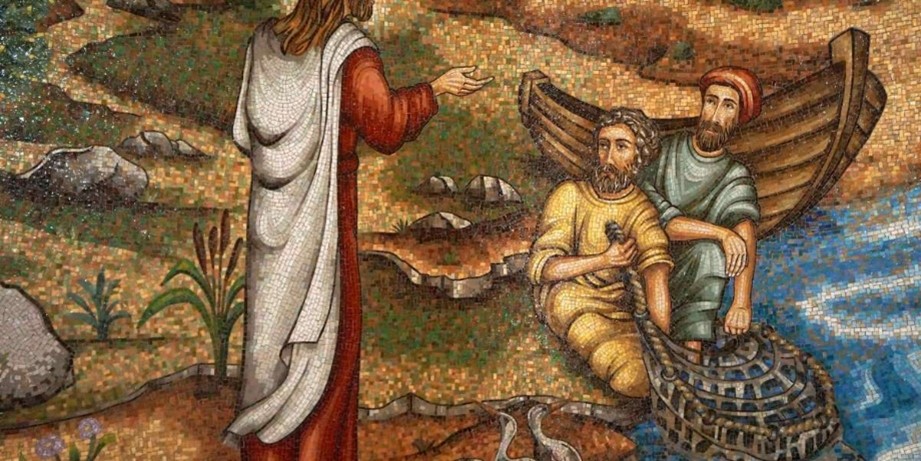
The miraculous can (and does) happen but we’re especially drawn to these stories of the fantastical, because we hope for such clarity and direction for ourselves. The idea that we all have an inherent purpose which we need to find is a big part of our culture now: even the tagline in the RAF’s TV advert at the moment is “Everyone’s got that one thing they were born to do”. I hope I wasn’t born to do just one thing. I hope I’m a more nuanced and complex creature than one which can be boiled down to a single skill or role. This idea of destiny reduces us down to the jobs that we do, meaning that life finishes when we retire and puts a lot of pressure on young people, which for most only leads to disappointment. I don’t think it’s how God intended things to be. All these people in the Bible were given specific tasks for a time but as part of a much bigger picture and story. If we’re going to understand our calling, we need to see that big picture.
It starts on the grandest scale, back in Genesis 1 when God calls all things into being. God speaks and there is light; God speaks and there is sky; God speaks and there is land, vegetation, planets, stars, animals, and eventually humans. God’s words summon these things from nothing – they are called into being and then called by name. In Genesis 2 God puts Adam in the garden to “work it and take care of it” (2.15). That is, to nurture it and to protect it, to help it reach its full potential and restrain the forces that would dismantle it back into chaos. This is the calling of humanity: the nurture and protection of the whole created order. Creation exists for the glory of God, and humanity within that for creation’s care and nurture.
If we zoom in just a little bit, we see that God chose to use a particular people to bless the rest of humanity. Israel was to be “a light for the nations” (Isaiah 49.6), remaining faithful to the true God in the face of the other nations’ idols and false worship. They were given laws full of justice and mercy. They were to shelter the stranger and care for the widowed and orphaned. Stories of heroics and miracles are easier for us to read than lists of laws and chapters of temple building instructions, but in focusing on individuals such as Moses, Elijah and David, we can forget that they were part of a much bigger story. We can lose sight of God’s calling of a nation to be a blessing to all humanity.
Then Christ comes and expands that calling to include the Gentiles as well as the Jews. The coming of the Holy Spirit at Pentecost births the Church, and a new people is called together, centered around Christ, to mediate to the whole world God’s self-giving love. They – we – are called, as a body, to represent to humanity the good news (ie. the “gospel” which Paul mentions in 1 Corinthians 1.10-18) that God has not given up on the world and continues to love and sustain it. Still fully a part of humanity, the Church is tasked with drawing people back into fellowship with God through Christ.
The baptismal liturgy of the Scottish Episcopal Church begins by saying that “In Christ God reaches out to us. In baptism God calls us to respond”. When we hear God’s call to follow, we offer ourselves in Baptism, another communal act – we can’t baptise ourselves. And at baptism we are called again: the liturgy asks for a profession of faith but also a commitment to Christian life. It asks if we will “continue in the Apostles’ teaching and fellowship, in the breaking of bread and in the prayers … proclaim the good news by word and deed, serving Christ in all people… work for justice and peace, honouring God in all Creation”.

Any other sense of calling, any other gifts and skills, all tasks and activities, are rooted and grounded in this identity: as a human being and as a baptised member of the Body of Christ. We can become frozen by a sense that we have to wait for the neon sign in the sky to tell us what to do but the reality is that we have already been told and it’s less about what we do and more about how we do it. There’s great freedom in that. Furthermore, it assures us that God never stops calling us into action and that what that looks like can change over time as we reach different stages in our lives.
So we are all called: as human beings, as baptised Christians, and as the Body of Christ the Church. We may discern in our circumstances, gifts, and desires, a calling to a particular task but our primary calling and identity will always be in the baptism in which we offered ourselves to God, and from which Christ sends his body the Church into the world.
Almighty God, by grace alone you call us and accept us in your service. Strengthen us by your Spirit, and make us worthy of your call; through Jesus Christ our Lord, who lives and reigns with you and the Holy Spirit, one God, now and for ever. Amen.
Nerys writes: On the feast of Pentecost at the end of May this year, Bishop Ian will join us for a special service where some of you will affirm for the first time the promises made on your behalf when you were baptised and the rest of us will join in by expressing our faith and our commitment to following Christ. Between now and then, in preparation for this important day in the life of our church. we will be reflecting together on the sacrament of baptism in order to deepen our understanding of what it is to be a baptised person.
I wasn’t a great rebel when I was at university. In fact, probably one of the most adventurous things I did with my new-found freedom from parental authority was to regularly leave the hostel in the morning without having dried my hair. Recently, my memories of walking outside with wet hair and my understanding of baptism came together when I stumbled upon the painting by Mike Moyers below. It depicts the moment in the first chapter of Mark’s Gospel where Jesus steps out of the water and walks off in the direction of the wilderness, soaking wet, following the Spirit’s call.
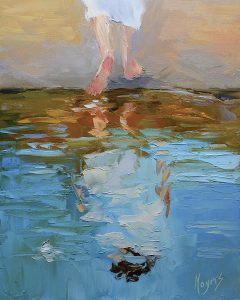
I suppose the water from the baptism Jesus received from John would have evaporated very quickly in the heat of the Mediterranean sun, but the gifts he received from God on that day were to accompany and empower him on his journey to the Cross and beyond. As he submitted himself to the water, God responded by filling him with the Holy Spirit, and by naming his identity, affirming his relationship as God’s beloved child.
Baptism for Jesus was not a one-off event but a two-way, life-long process. This is true of our baptism also. Most of us won’t have any memory of it, but we are all on a journey that started at the font on that particular day. Like Jesus, we have God’s Spirit as our companion and guide, and, if we listen, we can still hear God’s claim on us echoing down the years: ‘You are my child whom I love; with you I am well pleased.”
After we are baptised, life can still be a wilderness at times, full of confusion, disappointment, pain and loneliness. Our baptism does not spare us from difficulty, but it does help us deal with it in different ways.
At our baptism, our story becomes part of the story of all the people of God and of the whole of creation. In the baptismal prayer of our church, that biblical story is told from the beginning, when God’s spirit moved over the face of the waters. We are reminded of the times when God used the gift of water to nourish his people, transforming deserts into gardens, when God calmed the wildness of the waves, put a rainbow in the sky as a sign of hope, and parted the Red Sea to lead his children from slavery to freedom. Our baptism has brought us into this ancient story of God’s dealings with humanity, a story through which we can make sense of our lives and of the world.
In baptism we also become part God’s Church so that we are never alone on our journey. In the account of his baptism in today’s Gospel passage, John 1.29-42, the first thing we see Jesus doing as soon as he steps out of the water is to call a group of people together to walk with him. One of the striking changes between the life of the prophet whose longe voice is heard in our Old Testament reading, Isaiah 49.1-7, and the Corinthian Christians Paul greets in the New Testament reading, 1 Corinthians 1.1-9, is the gift of the Church. When we are baptised, we enter into a spirit-filled community who share in God’s calling, who witness and serve together and who learn from one other as well as from God.
Baptism is a visible sign of an invisible reality. It is a sign that points to the nature and work of God and the means by which we are adopted into God’s family. It is also a seal, a guarantee that God keeps God’s promises to us. At baptism we are given a new identity as God’s own children. We enter into a new life with Christ. The apostles and the church fathers used images of rebirth, washing clean, and dying and rising again to express in their writings the work of baptism in our lives. At times when I feel myself drifting away from God, I remind myself of the fact that I have been baptised. I imagine the water of baptism still clinging to my hair, I feel its freshness on my skin, I see the droplets glistening as I walk, and I remember that I am unconditionally loved. I know that no matter how far I have wandered, through God’s amazing grace, I can return, I can have a new start, be born again, washed clean, raised with Christ and filled once more with God’s spirt of love.
I hope that today and in the weeks to come, you will join me in praying for those who are intending to affirm their baptismal promises at Pentecost and that you will also take time to recall your own baptism and consider what it means to you. I invite you now to reflect on the painting of Jesus’ Baptism above and also on the beautiful Prayer for the Affirmation of Baptism, (SEC 2006) slightly adapted to include us all.
God of mercy and love,
new birth by water and the Spirit is your gift,
a gift none can take away;
grant that we may grow into the fullness of the stature of Christ.
Fill us with the joy of your presence.
Increase in us the fruit of your Spirit:
the spirit of wisdom and understanding,
the spirit of love, patience and gentleness,
the spirit of wonder and true holiness.
Come, Creator Spirit, rekindle in us your gifts of grace,
to love and serve as a disciple of Christ.
Renew our life in Christ
and bring to completion all that your calling has begun.
Empower us to bring life to the world.
Living God, sustain us and all your people
to be hope and strength to the world;
through Jesus Christ, our Lord, t
o whom with you and the Holy Spirit
be honour and glory, now and for ever.
Amen.
Rachael writes:
Like much of the Christmas story, the journey of the Wise Men (Luke 2.1-12) can begin to feel like any other myth, legend, or fairy tale. We know it well but it’s something from another world. These travelers from the East (maybe Kings themselves? or Magi: priests, astrologers, and magicians?) with their gifts of gold, frankincense, and myrrh, are more well-known than the angels and their declaration of the glory of God. Even with the primary 7 pupils who attended The Christmas Journey, we had to work hard to get them to think of other things you might bring a baby, they were so keen to share their knowledge of this part of the story.
We’ve lost something of the wonder or mystery of this story. There’s little to no sense of awe to accompany it but it is wondrous and mystical. It’s an epiphany!
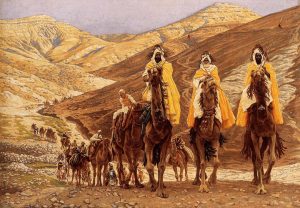 Tisso, “Magi” These were strangers from the East, or more literally, “from the rising of the sun”. Their name suggests that they were of the priestly Magos class in the Zoroastrian religion from the Persian empire which stretched from modern day Eastern Syria to the fringes of India – that’s anything from about 500 to 2500 miles away. On foot. Through foreign lands. For a star. A prophecy. A King.
If the shepherds show us that Jesus came for the lowliest in society, the Wise Men show us that he came for all the world. They are strangers in every way – in ethnicity, nationality, and religion. They are truly aliens in a foreign land. Nobody was expecting them but still they came. And now they are fellow heirs, members of the same body, and sharers in the promise of Christ’s Good News.
They came, following the star. A light in the sky but not a neon sign, with an arrow saying “Here!”. An unusual brightness but not a google maps print out nor a set of sat nav directions. Imagine their excitement at first seeing it, as their prophecies had foretold. Imagine their questions. Their fears and anxieties. Imagine their hopefulness for all that it might mean. Did you notice that they saw the star rise and then travelled Jerusalem, to their best guess as to the location of the King of the Jews? They saw a sign and they headed out, not knowing if they were correct but using the knowledge that they had to do their best.
And then they ask for help: “Where is the child?”. They don’t presume to have the full picture and they’re not too proud to ask those who might know more. They had lived with these questions through all their travels. I wonder if they were disappointed when the answer was, “Another day’s journey that way…”. I wonder if they knew then that Herod had his own agenda, if they got a sense that this wasn’t a person to entirely be trusted.
Only then does the star move, guiding them more precisely, leading them to the “place where the child lay”. And there they fall on their knees in worship before him. They worship the King in a moment beyond intellectual understanding, a moment of deep knowing: of epiphany. It demanded a response of them so, along with themselves in worship, they offered their gifts – gifts for a King who would face great suffering. How did they know?
These were strangers who followed an inclination, asked for help, discerned the way forward, trusted the light, and who in humble recognition, offered what they had.
It’s the story of faith. We may feel like we know it well, or it may feel more like a story that we’re just beginning. But the thing about these stories is that they can become stale. Like a well-known myth or legend, they can become background noise that we don’t really pay close attention to.
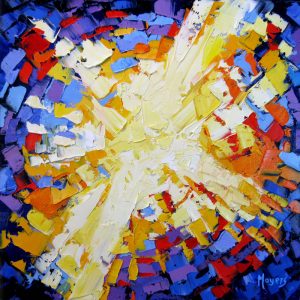 Mike Moyers, “Awake My Soul” The Wise Men remind us that no matter who we are, we are invited on this journey. And there we will see many signs and wonders – perhaps a star in the sky, or a dream in the night, or the kindness of stranger, or the love of a friend – that will point and guide us towards God. Can you remember such an awakening moment in your own life? Are you open to, even actively looking, for more? Along the way, it is good to ask for help: we are not on this journey alone and questions help all of us to grow. God gives us the church as a place of encouragement and discernment because our faith is not one to be practiced alone. There can, however, still be times of darkness and in them, like the Wise Men, we keep putting one foot in front of the other, holding onto hope in the Light that cannot be overcome. We need to continually be discerning our next steps, including how we navigate the twisted value systems of this world that might try to pull us off course. Are we open to dreams and signs and the still, small voice? If we’re going to pay attention to such things, we need to cultivate space in our lives for those moments of recognition and self-giving.
The eucharist is one beautiful place where that can happen. In it we see Christ’s self-giving and in return we together offer ourselves. A single, holy, living sacrifice. A moment of epiphany.
But these things – revelation, discernment, the help of others, self-giving – aren’t things to be relegated to church. We should expect and pursue them in all of life. How will you prepare for, and seek, epiphany in the coming year?
For prayerful pondering:
Name and give thanks for a moment of wonder.
Resolve to offer your gift this year in a particular way.
Name some aspect of darkness and pray for light.
Name a companion on the journey and give thanks for their support.
O God, who, by the guidance of a star,
revealed your only-begotten Son to the nations:
Grant that we, who know you now by faith,
may at the last be led to see your glory face to face;
through the same Jesus Christ, our Lord,
who lives and reigns with you,
in the unity of the Holy Spirit, one God, world without end. Amen.
Rachael writes: “What’s in a name? That which we call a rose by any other name would smell as sweet” I’m sure we’re all familiar with these words from Juliet as she tries to convince Romeo that his name, the name of her family’s rival house of Montague, is unimportant. It’s often quoted to suggest that the names of things do not affect the what they really are.
 We know that that is true, in the sense that it is factual. To call a rose a table doesn’t suddenly make it a table. But we also know the importance of names. Parents agonise over what to call their children. There are hundreds and hundreds of websites out there with millions of names listed to help them choose. You can take tests and questionnaires to find the perfect name for your baby. It’s generally the second question asked of parents to be, after what the gender is, “have you chosen a name”. Because in that we think we can grasp something of the (still yet unborn) child’s identity. The name tells us a story, gives us a glimpse of their future. We know that that is true, in the sense that it is factual. To call a rose a table doesn’t suddenly make it a table. But we also know the importance of names. Parents agonise over what to call their children. There are hundreds and hundreds of websites out there with millions of names listed to help them choose. You can take tests and questionnaires to find the perfect name for your baby. It’s generally the second question asked of parents to be, after what the gender is, “have you chosen a name”. Because in that we think we can grasp something of the (still yet unborn) child’s identity. The name tells us a story, gives us a glimpse of their future.
I wonder if any of you have ever changed your name? Maybe your first name in an attempt to reinvent yourself or give a certain impression in a new environment, such as going from family nickname to something more formal, Bob to Robert or Flic to Felicity. You may have decided to go in the other direction and tried to throw off your childhood trauma by changing the name that was used to nag or criticise you, coming up with something new or alternative that you felt better suited your personality. Approximately half of the married people here are likely to have made a change to their name at some point as well. It’s not such the done thing these days, or at least, it’s not just assumed that the woman will take the man’s name. We have friends who combined their names to come up with something new altogether. Of course, for Charlotte and I there wasn’t the same cultural precedent so we got to choose. In the end I took Charlotte’s name and for a long time I found it strange and a little sad to no longer be Rachael Harrison. But now I am a proud Wright, it feels like it fits, and I never think twice about it.
So names are important. They do tell us something about the person they belong to. They are personal and can be deeply tied to our identity. We take them for granted I think but they’re quite powerful really.
The name “Jesus” means “Yahweh saves”— and it is holy in every way. It signifies the bearer’s divine status on account of his supernatural conception by the Holy Spirit, and it spells out the specific mission on which he is sent: to be God’s agent of salvation for Israel, and through Israel, for the whole world.
Gabriel and the angels who appeared to the shepherds, give us many titles for Jesus: Son of the Most High, Son of God, Saviour, Messiah, and Lord. Each is a window into Jesus’ identity and mission. There are many, many more, but they are all encapsulated in “Jesus”.
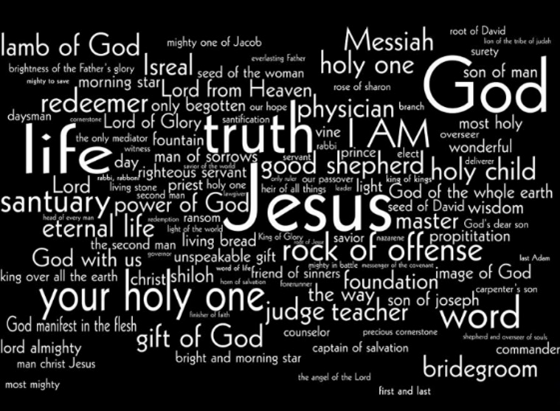 Somehow that name made its way into common parlance as an expletive and that has only served to cheapen something which should be holy and awe-inspiring. We can easily forget the meaning and the one to whom it belongs and throw “Jesus” around like it’s “Jo” “Jack” or “Jane”. There are two contemplative prayers which I use where saying the name of Jesus, though not really the primary function of the prayer, has become a very powerful spiritual practice for me. One is the Jesus prayer (“Lord Jesus Christ, Son of God, have mercy on me a sinner”) and the other is the rosary (“Hail Mary full grace, the Lord is with thee…blessed is the fruit of thy womb Jesus”). It’s declaratory and worshipful, humbling and hopeful, to say the name of Jesus in prayer. Somehow that name made its way into common parlance as an expletive and that has only served to cheapen something which should be holy and awe-inspiring. We can easily forget the meaning and the one to whom it belongs and throw “Jesus” around like it’s “Jo” “Jack” or “Jane”. There are two contemplative prayers which I use where saying the name of Jesus, though not really the primary function of the prayer, has become a very powerful spiritual practice for me. One is the Jesus prayer (“Lord Jesus Christ, Son of God, have mercy on me a sinner”) and the other is the rosary (“Hail Mary full grace, the Lord is with thee…blessed is the fruit of thy womb Jesus”). It’s declaratory and worshipful, humbling and hopeful, to say the name of Jesus in prayer.
“Yahweh saves” – our reading from Galatians 4 is a wonderful development of that tiny phrase and huge concept: “God sent his Son, born of a woman, to redeem those who were under the law, so that we might receive adoption as children. And because you are children, God has sent the Spirit of his Son into our hearts, crying, “Abba! Father!” So you are no longer a slave but a child, and if a child then also an heir, through God”.
Jesus – Yahweh Saves – has come that we might be adopted into God’s Kingdom. And if we can cry “Abba, Father” then we are also called by a new name: “children of God”. Whichever name we might have changed or taken in the past, whatever our parents might have called us, our truest identity is there as God’s precious and beloved children. That is who we belong to. Is there anything more powerful?
As we go forward into this new year, may we treasure these words, this name, and like Mary ponder it in our heart. May we, like the shepherds, glorify and praise God for who God has made us. And like them, may we share this incredible news with all whom we meet, that they too might be amazed.
Our collect for today:
Eternal Father,
who gave to your incarnate Son the holy name of Jesus
to be the sign of our salvation:
place in every heart, we pray,
the love of him who is the Lord of every year
and Saviour of the world;
who lives and reigns with you,
in the unity of the Holy Spirit,
one God, in time and for eternity. Amen.
Nerys writes: A blessed Christmas to you and those you love!
I wonder if you have bought and sent Christmas cards this year? They say that the tradition of sending handwritten cards in the post is on the wane and it’s not surprising when we consider the cost of stamps and the convenience of digital cards, delivered at the click of a button. I used to look forward to receiving Christmas cards and parcels through the post when I was a youngster. As a keen philatelist, I was always on the look-out for the more unusual denominations of Christmas stamps to complete my set for the year. I don’t collect stamps any more, but I still have an interest in the history and design of British stamps. I must admit that I did get a little excited when I realised that this year’s Christmas issue is particularly significant. Their theme also ties in with today’s readings, Isaiah 9.2-7 and Luke 2.1-20.
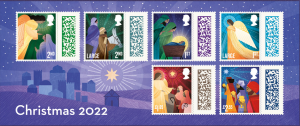
These are the last Christmas stamps to have an image of Queen Elizabeth on them. Next Christmas it will be replaced with that of King Charles. These stamps represent the end of an era and the beginning of a new one. These, also, are the first Christmas stamps to be barcoded. Apparently, these barcodes will make it possible for the Royal Mail to precisely track and trace every piece of post, but they will also enable customers to interact with a special app on their mobile phones. This is seen as the biggest change in the way the post operates since the Penny Black was introduced in 1840. These stamps represent a revolution, a completely new way of doing things.
There’s nothing unusual in the fact that these stamps depict key moments in the story of the first Christmas. We have the angel greeting Mary, the journey to Bethlehem, the child in the manger, the appearance of an angel, the arrival of the shepherds and the wise men. What’s special about this issue is that each stamp is designed to look as if it is emitting light. If you look carefully, you’ll see that within each stamp is a central point of light with rays shining from it. I don’t know to what extent their designer has been influenced by the Old Masters, but they often depicted the stable in darkness with light from the baby illuminating the faces of the figures around the manger.
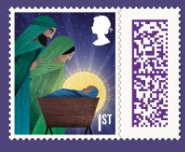
It’s hard for us to imagine how dark it would have been in Bethlehem when Jesus was born. There would have been no street lights and household lighting was only affordable by a few. When night fell, it was dark and the darkness would have been very frightening.
The prophet Isaiah spoke of his people living in a land of deep darkness. They were a conquered people whose very existence was under threat, a people deeply afraid, stumbling along in the dark, longing desperately for dawn to break. ‘My soul waits for the Lord, more than those who watch for the morning’, sings the psalmist. They were yearning for God to send the promised king who would bring justice and peace. The birth of this child would be like a great light brining in a new era, a completely new way of doing things.
In the days before Jesus were born the people of Israel were still walking in the darkness. Living under foreign rule in a deeply unjust society with a corrupt religious system, they were still longing for God to send a saviour, someone who would be source of light for the whole world. The message of the angels came in the darkness on the hillside above Bethlehem to ordinary people whose work was dirty and rough. The glory of God shone around them and they were terrified. And yet as they stood there in the light of heaven, they recognised that this was good news. Something had happened that would change everything. A new source of light had come into the world who would bring great joy. Standing at the manger, they must have realised how fragile this light was, embodied in a newly-born child. And yet this light was powerful enough to send them out, glorifying and praising God for all they had heard and seen.
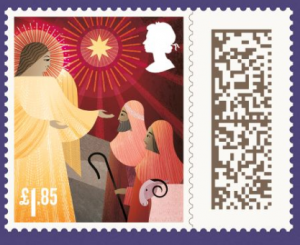
The gift of God’s light, the light of Love, still comes when we least expect it. It can come to us in and through the must unexpected of people and circumstances. It is fragile and yet piercing, searching and life-changing. It comes to us in the beauty of worship and in the everyday routines and the messiness of our lives. And when it comes, it transforms us, making us, like the shepherds, sources of light for others.
We are called to celebrate the light that has come into the world by living as Children of Light, as followers of Jesus. We are called to celebrate the Good News proclaimed today. We are called to tell the world, for this is news too good to keep to ourselves!
God of Hope, God of Love, God of Joy, God of Peace,
You dwell in glorious light and yet you choose to live among us.
May your Spirit fill us with the light of your love and kindness
as we celebrate the birth of Jesus, the Light of the World,
One God, now and forever. Amen.
 Nerys writes: I wonder if you are ready for Christmas? Are there things that are still to be done? Is there anything that you are putting off until after Christmas – perhaps something that really needs to be done now? Most of us tend to put things off thinking, mañana, tomorrow … Sometimes it’s because we are too busy, or we have other priorities, or perhaps we don’t really want to face whatever it is. In today’s Old Testament reading, Isaiah 7.10-16, King Ahaz did not want to face what was looming, and when God offered him a sign, he justified his reluctance by saying that he didn’t want to put God to the test. Little did he know just how important God’s sign would become, not just for himself but for the whole world … Nerys writes: I wonder if you are ready for Christmas? Are there things that are still to be done? Is there anything that you are putting off until after Christmas – perhaps something that really needs to be done now? Most of us tend to put things off thinking, mañana, tomorrow … Sometimes it’s because we are too busy, or we have other priorities, or perhaps we don’t really want to face whatever it is. In today’s Old Testament reading, Isaiah 7.10-16, King Ahaz did not want to face what was looming, and when God offered him a sign, he justified his reluctance by saying that he didn’t want to put God to the test. Little did he know just how important God’s sign would become, not just for himself but for the whole world …
When Joseph, on the other hand is given a choice to respond to the message of the angel or not, he doesn’t hesitate. Read Matthew 1.18-25 to remind yourself of the story. Joseph doesn’t play a prominent part in the Christmas story. There are no lines and little action, even in Matthew which tells the story from Joseph’s perspective. Mary gets to speak and sing, whilst Joseph is the silent partner. But his choices and his actions are a vital and significant part of God’s story.
In the reflection that follows, David Campton imagines what Joseph might have said.
I’m no dreamer. Not like my namesake – the son of our forefather, Jacob, and friend of Pharaoh. I’m a working man. I work with wood and nails, things you can touch and shape and hit with a hammer. And I did a lot of that when Mary first told me.
I couldn’t believe it. How could she do that to me? Who was the father? All she would say was: “It was nothing to do with me. The baby was conceived by the Holy Spirit, ordained by God himself.” Well, I’ve heard some excuses in my time. Who do you think I am – a fool born yesterday!?
But she seemed so genuine, so innocent. And, I thought, so naïve. Who has taken advantage of you? Who? I asked. But she named no-one. So, I planned to drop the whole thing quietly, leave it to her parents to ship her off to some relatives to have the baby. But I knew the news would get out. The shame would stick – to me as well as to her. And I took my frustrations out on the wood in my workshop.
But then, I had that dream. I hadn’t been sleeping at all since Mary told me. It was my first decent night’s sleep, and I was annoyed to be roused – only to realise that I wasn’t awake, and what stood before me was more real, more solid, than anything in this world. An angel. A messenger from God, he claimed.
And he confirmed Mary’s story. This child within her was not the result of a teenage fling, or someone taking advantage of a foolish girl, but conceived by the Holy Spirit. I was told he was to be called Jeshua – Jesus – which means ‘God Saves.’ A good name.
Somehow this child growing within Mary is supposed to save us all from our sins, and fulfil the words of the prophet: born of a virgin, showing that God is with us – Emmanuel. Well, he’d better be with us, because it won’t be easy. Not everyone will believe the story. Tongues will wag and fingers will point.
But I will do what I can. I’ll carve a cradle for this Son of God. I’ll try to teach him the word of his Father. And I’ll train him in my trade: to work with wood and nails.
We are all part of God’s story. We all have a role to play. Our story can be shaped by God’s story if we choose.
We hear Mary’s ‘yes’ through her words but we see Joseph’s ‘yes’ through his choices and his actions. The angel encourages Joseph to take Mary as his wife, to stand alongside her in her vulnerable, marginalised position, to care for her and protect her. The angel also invites Joseph to name the child, to adopt Jesus into his own family and into the story of God’s people, to give ‘ the One who Saves’ a place in the line that runs right back to Abraham. Joseph may not have words to say in God’s story but his choices and his actions mean that he has a massive part to play.
We are all part of God’s story. We all have a role to play. Our story can be shaped by God’s story if we choose.
I wonder what you are choosing this Advent? In your waking, in your dreaming, how are you listening for and attending to the messages and the invitations that are waiting for you from God?
Take some time to ponder as you reflect on images of Joseph and read the prayer below.
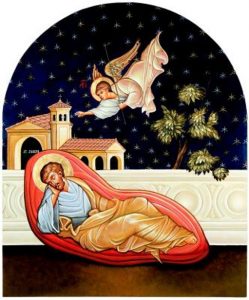
‘A Prayer for Choosing’ by Jan Richardson
What we choose
changes us.
Who we love
transforms us.
How we create
remakes us.
Where we live
reshapes us.
So in all our choosing,
O God, make us wise;
in all our loving,
O Christ, make us bold;
in all our creating,
O Spirit, give us courage;
in all our living
may we become whole.
Amen
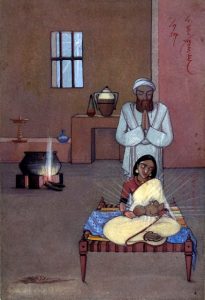
You may wish to finish your time of worship by praying for areas in the world, in the Church and in your life where choices need to be made and ask for God to guide the decision-making.
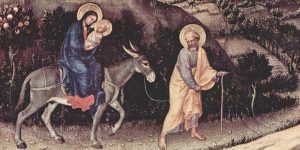
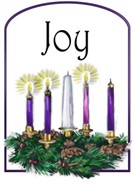
Rachael writes: For the second week, our gospel passage focuses on St John the Baptist (Matthew 11.2-11). Many of us will quickly bring to mind an impression of a somewhat alternative fellow: dressed in camelhair, a wild beard, living off of locusts and honey. I was really struck by what Nerys shared last week though of the faithfulness of this man. Of the lengths that he went to, to be obedient to God’s call, and to point, beyond himself, to the coming Christ.
In our passage today, however, it seems as though this faithful man has a moment of hesitation. Are you the Messiah? he sends his followers to ask from his prison. Are you the one? Or do we need to keep waiting for another? I wonder if you hear a hopeful tone, or a hesitant one? The accompanying question is only implied – am I to stand with you or against you?
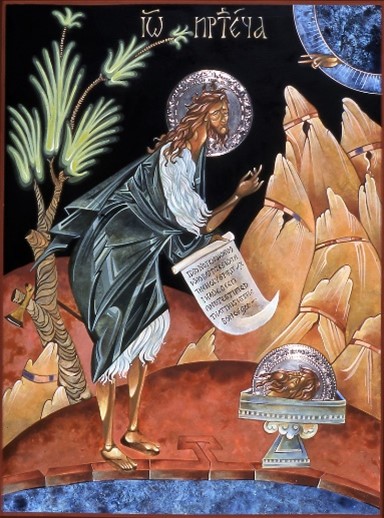
John’s desert ministry involved rather a lot of judgement. “You brood of Vipers” he declared. “Every tree that does not bear good fruit shall be cut down”. “I baptise with water for repentance but one is coming who is more powerful than me”. I don’t suppose he could have imagined that that power would be manifested in feeding people, in healing the sick, in setting people free from demons, in eating dinner with the vipers. John was perhaps expecting a little more force, and a little less fellowship; a little more liberation, and a little less love.
We too can become tired like John. We can start to look around us and say “where are you God?”, “why are we waiting?”, “is Jesus really coming?”. Like John, even the most faithful amongst us can find ourselves asking, are you the one, or do we need to wait for another?
The Psalms can be a wonderful place to turn in those moments. They are full of questions, full of doubt, full of wrestling. And full of joy. Like today (Psalm 146.5-10): “Happy are those whose hope and help is in God” (v.5). God who created all things and executes justice. Who watches over and upholds and reigns.
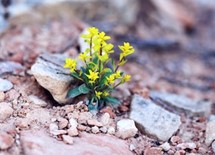
Isaiah is another excellent part of scripture to turn to with these questions. Again, it’s full of the angst of a people in exile, not sure if or when God’s going to show up in the way that they want but quietly aware that God has always been faithful. This morning’s passage from chapter 35 (verses 1-10) is a beautiful description of what it will be like when the exiles return, of God’s transforming redemption of all things: “The wilderness and dry land shall be glad, the desert shall rejoice and blossom”.
Who do we know that has spent a lot of time in the wilderness and the desert? John the Baptist. Jesus points out that the people went to the wilderness to look for something – not a wimp buffeted by the wind like a reed nor a bureaucrat trying to fool everyone in their finery – but a prophet, the true prophet. The wilderness is where God’s people have always been formed. On the edges, beyond the walls, amongst the outcasts, is time and again the landscape of our shaping and molding and creating.
Jesus says I am here, this is me. In this work on the edge, in the wilderness. Where the blind receive their sight, the lame walk, the deaf hear, the dead rise, and the poor are brought good news. The Psalms attest to it, Isaiah attests to it. This is the breaking in of the Kingdom. We might ask, will Jesus really come? He might respond, do you have eyes to see?
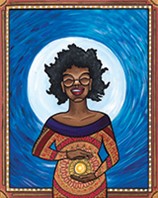 Our candle today represents joy. It comes from the first word of the introit for today in the Latin Mass: Gaudete in Domino semper, Rejoice in the Lord always. Even as we question, even as we doubt, we can still rejoice, like Mary who announced that the Mighty one has done great things in lifting up the lowly, filling the hungry with good things, and sending the rich away empty. This is the advent of heaven, which breaks in unexpectedly. God’s help and hope has no limits, if only we have eyes to see. “Everlasting joy shall be upon their heads; they shall obtain joy and gladness, and sorrow and sighing shall flee away”. Our candle today represents joy. It comes from the first word of the introit for today in the Latin Mass: Gaudete in Domino semper, Rejoice in the Lord always. Even as we question, even as we doubt, we can still rejoice, like Mary who announced that the Mighty one has done great things in lifting up the lowly, filling the hungry with good things, and sending the rich away empty. This is the advent of heaven, which breaks in unexpectedly. God’s help and hope has no limits, if only we have eyes to see. “Everlasting joy shall be upon their heads; they shall obtain joy and gladness, and sorrow and sighing shall flee away”.
What can you rejoice over today? Can you share with God your doubts and your hopes? Ask God for eyes to see the Kingdom breaking in in this world.
We pray: Stir up our prayers, Lord, and hear us: that they who are sorrowful and suffering may rejoice at the Advent of your only-begotten Son; who lives and reigns with you, in the unity of the Holy Spirit, one God, world without end. Amen.
Nerys writes: Now that I’m getting a little older, I’m attending more events to mark the retirement of colleagues and friends. Many of these are quite similar to each other, but there is one that stands out in my memory because it made a deep impression on me at the time. Although this person had given a lifetime’s service to the Church, nothing was said in the meeting about his contribution, his many achievements or the quality of his ministry. I found this very puzzling to begin with but understood the reason for it when he himself stood up to speak, starting by explaining that all he had ever wanted to be was a signpost to Jesus Christ and proceeding to make worship the focus of the rest of the evening.
My friend had been, and still is, someone who points others beyond himself, guiding them to Christ. I was reminded of his example this week when I was reading the lectionary passages, Isaiah 11.1-10 and Matthew 3.1-12, reflecting especially on the calling of John the Baptist and on our calling this Advent to help bring God’s hope and God’s peace into the world.
In Matthew’s Gospel, John bursts on to the scene with no introduction. We aren’t told of his family or of his relationship to Jesus. We know nothing of his life up to the moment when he appears in the wilderness of Judea and we hear his voice proclaiming repentance. We do learn, however, that he is the fulfilment of Isaiah’s message. He is the herald summoning his people to prepare the way of the Lord. He is the new Elijah, dressed in the wild prophet’s rough clothing, living like him on God’s provision. He is the fearless, fearsome preacher calling out the hypocrisy and complacency of the religious leaders of Jerusalem. He is the baptiser, offering a new start and new hope to ordinary people. He is the last of all the prophets, challenging his people to turn away from evil and return to God so that the Messiah might come.
It is no wonder that John becomes a celebrity and crowds flock to the Jordan to listen to him and to be baptised. His rich identity and powerful acts draw people’s attention to him and yet his words draw attention only to the one whose coming he announces. He makes it clear to everyone that his ministry is not about himself but about someone far more powerful, one he isn’t worthy to carry his sandals. He is just a signpost, directing people to God’s anointed one.
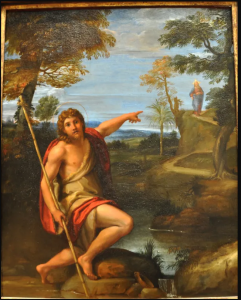
As his fame and his following grew, it must have been so tempting for John to turn the focus on himself. The natural, human response would have been to seek recognition for his extraordinary gifts, to ensure that his name would go down in history. How easy it could have been for John to change the course of his ministry, especially when the one he had proclaimed is nothing like he imagined, when he turns out to be someone whose approach is quite different from his own. As the tensions between them grew, how easy it would have been for John to yield to the expectations of his followers and split from Jesus. And yet, even from his prison cell, John points his disciples to Jesus declaring, ‘ He must increase but I must decrease’. John is happy to be forgotten, provided that his message is heard.
I wonder what it was that enabled John to continue his life-long undertaking , even in the face of puzzlement, disappointment and danger. We are not told of his early life but we can imagine the depth of his relationship with God who had called him to this task from the moment he leapt in his mother’s womb in the presence of the unborn Christ. Luke tells us that he came among the people only after he had undergone years of lonely preparation in the wilderness. We can imagine the difficult decisions that he grappled with in that thin place. Among them, the decision not to become a priest like his father and forefathers but to turn his back on his family and go the way God was leading him. The decision not to make Jerusalem his base, but to leave the centre of power in order to live on the margins, in the harsh environment of the wilderness. The decision not to serve the temple elite but to offer purity to anyone who came to him in the Jordan, even tax collectors, soldiers, prostitutes. The decision to speak truth to power despite the knowledge that it would inevitably result in his punishment and death.
We can imagine how John’s reliance on God had grown during the years of solitude in the wilderness. John wasn’t given all the answers. He received no reward. He didn’t see in his short, harsh life what we can all see now, but his deep trust in God enabled him to initiate his ministry and stick faithfully to his calling throughout his life. And it was this trust which gave him peace of mind even in the bleakest of circumstances. ‘No one is greater than John’, said Jesus, ‘and yet the least in the Kingdom of God is greater than he’.
In this season of Advent, we are called to help bring God’s hope and God’s peace into our broken world. Like John, we won’t be given all the answers. We can expect no reward. Our job is simply to steadfastly point to Christ through our words, our actions and who we are. It is no easy task. In order to draw the attention of others to Jesus, our attention needs to be removed from our preoccupation with ourselves so that it can be wholly focussed on him. It requires self-discipline based on a deep trust that we are loved by God and the knowledge that we have God’s spirit of love among us and within us to inspire and equip us, to speak for us and to guide us.
I invite you to take time today and in the days ahead as we prepare for the coming of the Prince of Peace, to prepare your heart through prayer to serve as one who points others to Him.
Nerys writes: For me the first day of Advent every year brings with it a mental check-list of tasks that need to be done before Christmas. These include climbing into the attic to retrieve our Nativity set which will have been carefully packed away the previous January. As I set out the figures, my mind always goes back to the day in 1990 when Davie and I bought them in a market square in Kraków only a few months after we had met. This was the first item that we bought together for our future home. At that point it was difficult for us to envisage a life together. Our academic careers were set to keep us apart, the one in Scotland and the other in Wales. The act of jointly buying the Nativity set represented our hope that somehow, one day, the future we longed for would come about.
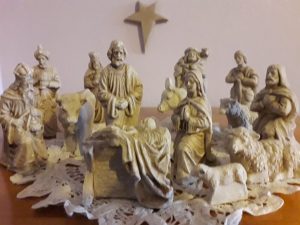
Today in church the first candle will be lit on our Advent Wreath, the candle that represents Hope. I wonder if you’ve ever thought what hope means for us as followers of Christ? Thankfully, it is much more than wishful thinking or a strong desire for something to happen. And it isn’t based on chance, a crossing of our fingers, or on having an optimistic outlook on life. As we are reminded when we reflect on our Bible readings this morning, Isaiah 2.1-5, Romans 13.11-14 and Matthew 24.36-44, faith-filled hope is something quite different. It can be just a tiny flicker like a candle flame but the darkness can’t put it out because it is based not on what we think or feel but on who God is.
Isaiah’s sharing of his vision of a new Jerusalem, raised high above all the cities of the world, is a similar expression of hope. Despite its precarious position, threatened by enemies from the outside and corrupted by its faithless inhabitants, the prophet declares that Jerusalem has a golden future. A day will come when people from all nations will gather there to worship the God of Israel. And as they learn to live according to God’s ways, justice will prevail and people throughout the world will be moved to turn instruments of war into tools for peace.
We all long for a better world like the one of Isaiah’s vision, but it is hard to believe that such a future will actually come about when we are reminded every day of the fighting going on in the world, the inequalities and injustices in our own communities, the broken relationships in our own lives. The new future the prophet is offering his beleaguered people, however, isn’t dependent on their own efforts or abilities but on the faithfulness of God. This is the basis of the hope that Isaiah was articulating in some of the darkest days of his nation’s history. Regardless of where power seems to lie just now, the day is coming when God’s reign will be established for all humankind to see.
In the meantime, we, like the people of Judah, are called to live towards that day. We are called to trust that the future belongs to God, and to respond by walking in the light of God, one step at a time. This also is the message of St Paul in today’s passage from his letter to the Romans. He calls his readers to choose to live a God-centred life – to wake up from the darkness of their old lives, to peel off their night clothes of selfishness and ignorance and to put on the new clothes of Christ – the armour of light. And likewise Matthew’s Jesus, who warned his listeners not to sleep-walk through their lives but to be like Noah whose close relationship with God meant that he was watchful and poised for action when the Flood came.
Just as Christ came among us in the most unexpected way on that first Christmas, Christ comes to us again and again in our daily lives. He will often appear just around the corner, suddenly, like a sick friend, a neighbour in need, a refugee living in our midst. We have a choice to sit tight in the darkness or to respond by taking a step or two in God’s light. When we do the latter, we become light ourselves. We bring hope to others and the world is transformed.
As I set out our Nativity figures for our thirty-first Christmas together, I will look back with gratitude at what God has done in the life of our family and those memories will give me hope as I look to whatever the future may bring for us. I invite you during this season of Advent, to look back at what our faithful God has done for you, for God’s people and for God’s world, and I pray in the words of St Paul (Romans 15.12-13) that ‘the God of hope fill you with all joy and peace in believing, so that by the power of the Holy Spirit you may abound in hope.’
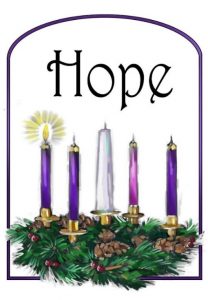
Jesus, light of the world bring hope to the dark places of this world.
Jesus, bearer of peace bring hope to people suffering from conflict and war.
Jesus, born in a stable bring hope to people who are homeless.
Jesus who fled to another country bring hope to all refugees.
Jesus who was hungry in the desert, bring hope to people who are poor and starving.
Jesus who comforted and healed, bring hope to people who are sick.
Jesus who rose from the dead, bring hope to people in despair.
Jesus, Son of God, Messiah, bring me hope this Christmas and use me to bring hope to others. Amen.
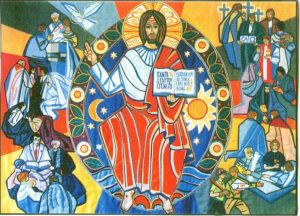
Rachael writes: Our readings on this Feast of Christ the King offer glimpses of the future. The prophet Jeremiah (23.1-6) describes how God brings all the remnant flock back to the fold where they no longer have reason for fear or dismay. Saint Paul in his letter to the Colossians (1.11-20) assures them of rescue from darkness and their share in the inheritance of the saints of light, with Christ in whom all things are reconciled. Saint Luke records in his gospel (23.33-43) that even in death Christ was offering mercy and hope to those who asked for it. I wonder which of these images resonates with you?
Today, many people will be singing Wesley’s great hymn O For A Thousand Tongues to Sing:
O for a thousand tongues, to sing
my great Redeemer’s praise,
the glories of my God and King,
the triumphs of his grace!
Jesus! the name that charms our fears,
that bids our sorrows cease;
’tis music in the sinner’s ears,
’tis life and health and peace.

A character in the detective novel I’m reading at the moment referred to their society as “a rowboat society”. “What do you mean?” someone asked him. “We move forward while always looking back,” he replied.
Immediately I thought what a perfect description that is of the Church. We are absolutely a rowing boat kind of people. We move forward at a variety of paces but really love to look back to what has gone before. Back to saints and the early church. Back to Christ. Back to the prophets; back to David, and Moses, and Abraham. Back, even, to the very beginning of all things.
Looking back like that can be a brilliant thing. It can show us where we’ve come from, that we’re still in the right lane, and if we’ve done that portion of the race then we can surely manage the next part set before us.
But today is the day in the Church calendar when we look over our shoulder and take a proper look at what is to come ahead, at where we’re going: towards Christ the King. Through whom and for whom all things were created. Who is before all things and holds all things together. Through whom all things are reconciled.
Or as the criminal on the cross beside him put it: “paradise”.
The irony is that Jesus never claimed the title of King for himself. In fact, as we heard in our reading, it was a title used to mock him. Jesus, however, is not the kind of King the world expects. He is the Prince of peace, the Light of the world, the Word become flesh. He didn’t seize dominion or battle for power but rather gave up everything. He set aside the essence of his God-ness to be with us and absorbed in himself all the terrible destructiveness of the human world, to establish a different world order and a new way, so that we might be with him in paradise.
This is the day in the year which gives me hope that one day Christ himself shall rule the earth with justice and righteousness and peace and love. That one-day there will be no reason for fear or dismay. That there shall be no more tears, no more pain, no more suffering. I look over my shoulder and I think yes!

If I’m going to keep rowing through the apathy, the misery, the commercialism, and individualism, of this world, I need to know, not just where I have come from but what I am headed for. I could just sit in my boat and let the current move me along until eventually I’ll get there. Or I could row. By the grace of God and gift of the Spirit I could row, choosing a different way and seeking to see that paradise in this world, in this life. That paradise which is manifested in how I speak to people, how I care for my neighbour, how I pay my employees, how I use my position on the board of trustees, how I raise my children and teach my grandchildren. In how I pray and how I hope.
We can all row, knowing where we’ve come from but also with the sure and certain hope of looking Jesus, Christ the King, the Light of the World, full in the face as he says, “today you will be with me in paradise”.
We pray: Almighty and everlasting God, whose will it is to restore all things in the kingdom of your well-beloved Son: mercifully grant that the peoples of the earth, now divided and enslaved by sin, may be freed and brought together under his most gracious rule; through the same Jesus Christ, our Lord, who lives and reigns with you, in the unity of the Holy Spirit, one God, world without end. Amen.
Perhaps you’d like to sing or pray these closing verses of our hymn:
He speaks; and, listening to his voice,
new life the dead receive,
the mournful broken hearts rejoice,
the humble poor believe.
My gracious Master and my God,
assist me to proclaim
and spread through all the earth abroad
the honours of thy name.
Nerys writes: Today is a day when we as Christians as called to do two things, to remember and to pray. It is 91 years since Armistice or Remembrance Day was first held to recall the end of the First World War when around 37 million people, both military and civilian, were killed or injured. Today, armed conflict is happening within at least 14 countries in the world – in Mayanmar, Afghanistan, Iraq and Syria, Colombia and Mexico, Ethiopia, Mali, Nigeria, Somalia, South Sudan, Burkina Faso, Democratic Republic of Congo, Sudan and Yemen. In these countries, thousands of people have been killed this year. In Mayanmar alone there have been 13, 500 casualties during the last ten months. And in February, the Russian Federation began a military invasion of Ukraine which has resulted in the deaths of at least 30,000 soldiers on both sides, the deaths of over 6,000 Ukrainian civilians and the displacement of more than 5.5 million. As we remember today the seven young men from St Mary’s who lost their lives in the Second World War – Ronald Gutteridge, William Guthrie, Alastair Guthrie, Frank Wilson, Fredrick Lax, John Fowler, Allan Heywood Ball – we also remember all victims of war and pray for peace.
Today’s readings are Job 19.21-27, 1 Corinthians 15.51-57 and John 6.37-40.
Our Scriptures teach us that down the ages, remembering and praying has shaped the future of the people of God. The story of Job was designed to remind the Jewish people of the need to trust in God’s promises even in the midst of suffering and in the face of death. God’s chosen people often forgot these promises but they are the foundation of any relationship with God. Jesus made the same promises, that if anyone comes to him, he will hold on to them and never let them go, that anyone who trusts who he is and aligns with him will enter real life, eternal life. This is the mystery of our faith, the mystery St Paul talks about in his first letter to the Corinthians. As we listen to these three readings, let us also remember the amazing transformative power of God’s spirit who is alive within us and between us. We remember all these things so that they will shape our lives and enable us to make a difference to our broken world.
This year once more, poppies have been made available in our church porch – red poppies which represent a commitment to remember those who have served and died in past wars and white poppies which represent a commitment to work and pray for peace. I wonder if you’ve ever thought how the poppy came to be the symbol used for Remembrance and what the red and white poppies represent?
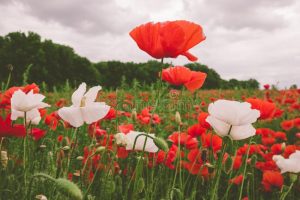
As you know, from 1914 to 1918, what became known as the First World War, took a greater human toll than any previous conflict, with some 8.5 million soldiers dead of battlefield injuries or disease. The Great War, as it was then known, also ravaged the landscape of those areas where most of the fiercest fighting took place. In the battlefields in Flanders and Picardy, churned up by fighting and shelling, one of the only plants that grew among the trenches and the mud was the red corn poppy.
It was this flower which provided a young Canadian soldier and surgeon, Lieutenant Colonel John McCrae with inspiration for a poem which he wrote whilst serving on the front line in 1915. As he tended to the wounded, McCrae saw first-hand the carnage which resulted from the Second Battle of Ypres where some 87,000 Allied soldiers were killed or wounded, as well as 37,000 on the German side. A friend of McCrae’s, Lieutenant Alexis Helmer, was among the dead.
Struck by the sight of the bright red flowers growing on the broken ground, McCrae wrote a poem giving a voice to the fallen soldiers buried under those hardy poppies.
In Flanders fields the poppies blow
between the crosses, row on row,
that mark our place; and in the sky
the larks, still bravely singing, fly
scarce heard amid the guns below.
We are the dead. Short days ago
we lived, felt dawn, saw sunset glow,
loved, and were loved, and now we lie
in Flanders fields.
Take up our quarrel with the foe:
to you from failing hands we throw
the torch; be yours to hold it high.
If ye break faith with us who die
we shall not sleep, though poppies grow
in Flanders fields.
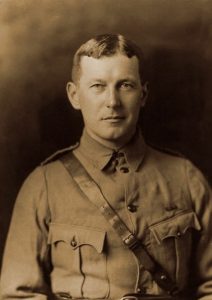
The poet John McCrae
The poem was published in Punch magazine and was used at countless memorial services in the months that followed so that by 1917 ‘In Flanders Fields’ was known throughout Europe and the English-speaking world. Immediately after the war, inspired by the poem, the French government used the red poppy as the emblem of an organisation to raise funds for those living in the devastated regions of France. Anna Guerln who had spent the war travelling around the USA, lecturing and raising funds for French widows, orphans and veterans, was sent back to set up an American branch of the organisation. She soon began organising Poppy Days when paper poppies would be distributed in exchange for donations. These took off and soon silk poppies made by French women, children and veterans were being imported to the US as a way of funding the rebuilding war-torn France.
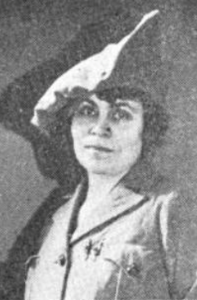 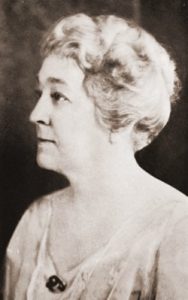
Anna Guerin and Monia Michael
In 1920, Mme Guerin started to promote the idea that all World War I allies should use artificial poppies to remember their fallen soldiers. The idea was taken up by Monia Michael, an American academic and well-known humanitarian. The American Legion gave her their support, the red poppy was adopted as the official US national emblem of Remembrance and a national distribution programme began in 1924.
In the meantime, Mme Guerin had brought her campaign to the United Kingdom, where she persuaded Earl Haig one of the founders of the British Legion to adopt the poppy as their symbol. In November 1921 the Legion held its first ever Poppy Appeal which almost immediately ran out of poppies and raised over £100,000 to provide housing and employment for veterans and their families. The following year, a factory, staffed by disabled ex-servicemen was set up in Richmond, so that the Legion could produce its own poppies. In those early days, the demand for poppies in England was so high that very few actually managed to reach Scotland. To meet growing demand, Earl Haig’s wife Dorothy established the ‘Lady Haig Poppy Factory’ in Edinburgh to produce poppies exclusively for Scotland.
Other nations soon followed suit in adopting the poppy as their official symbol of remembrance. Today, nearly a century after the end of the First World War, millions of people in the United Kingdom, Canada, France, Belgium, Australia and New Zealand wear a red poppy every November. In Scotland, over five million poppies are made by hand by disabled ex-Servicemen in Edinburgh.
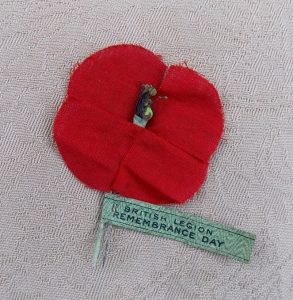
The red poppy is worn to show support for the Armed Forces community and to remember those members of that community who lost their lives on active service since the beginning of the First World War. It also honours the contribution of civilian services and the uniformed services which contribute to national peace and security and acknowledges innocent civilians who have lost their lives in conflict and acts of terrorism.
During the last ten years, poppies of other colours have been introduced: the black poppy to commemorate people of all nations of African, Black, West Indian and Pacific Islander heritage who contributed to war efforts, and the purple poppy to remember animals that lost their lives in war,
The white poppy, however, has a much longer history which is surprisingly similar to that of the red poppy because it was women also who started this movement as a response to the great losses of the First World War. The Co-operative Women’s Guild had become involved in peace activism before the war. In the years, that followed, they sought to change the social and political conditions that encouraged or gave rise to wars across the world as well as opposing the international arms trade. It was at this time when the guild numbered over 70,000 members throughout the United Kingdom, that they started to sell white poppies as an alternative to the red ones. The Peace Pledge Union took over their distribution from 1936, and a year later the first white poppy wreaths were laid alongside the red ones on Remembrance Day.
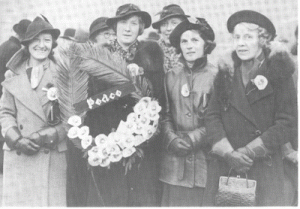
Today white poppies are worn by thousands of people across the UK and beyond. Their purpose is to remember all victims of war of all nationalities, both civilians and members of the armed forces. This includes the millions across the world who have been made homeless by war, families and communities torn apart, and those killed or imprisoned for refusing to fight and for resisting war. By drawing attention to the human cost of military conflict, the white poppy challenges any attempts to glamourise or celebrate war. It also symbolizes a commitment to peace, to finding non-violent solutions to conflicts and to tackling the underlying causes of warfare, such as poverty, inequality and competition over natural resources.

In our congregation and in our local community this week there are people who are wearing red poppies, white poppies, neither and both, reflecting a range of attitudes to Remembrance and different approaches to seeking peace. During the last few weeks, inspired by our Gospel passages from St Luke, we have been exploring what Jesus means when he speaks of the Kingdom of God and who is part of it. What we discovered is that all kinds of people are invited to be part of the Kingdom community: pharisees and tax collectors, fishermen and zealots, prostitutes and centurions. Despite our differences, we are all children of God who is Love, called to pray for each other and to work together for the coming of God’s kingdom. As followers of Christ, what unites us is much greater than that which divides us. Whatever we have on our lapel this week, we are all called to always remember those who have died or suffered because of war and to tirelessly work together for a just peace throughout the world..
Collect for Remembrance Sunday
O God, it is your will to hold both heaven and earth in a single peace. Let the design of your great love shine on the waste of our wraths and sorrows, and give peace to your Church, peace among nations, peace in our homes, and peace in our hearts; through your Son Jesus Christ our Lord, who lives and reigns with you and the Holy Spirit, one God, now and for ever. Amen.
Peter writes: It is often said that there is no such thing as a lone Christian. Belonging to the Church (in the widest sense of the word) is essential to being a Christian. Through baptism we become members one of another in Christ, part of a company of saints, embracing both those who are alive today and those who already in heaven. Some of them are people whose lives have touched ours; others are known to us solely through history or the Church’s calendar.
The Feast of All Saints and the Commemoration of the Faithful Departed (also known as All Souls’ Day) both celebrate this mutual belonging. All Saints’ Day celebrates men and women in whose lives the Church as a whole has seen the grace of God powerfully at work. It is an opportunity to give thanks for that grace, and for the wonderful way it shaped their lives. It is a time to be encouraged by the example of the saints but also to be mindful that God’s grace is present in the lives of ordinary people too. Sometimes this may be shown in the way they faithfully followed in Jesus’ footsteps in everyday situations; sometimes it shone forth in extraordinary crises or times of difficulty.
The Commemoration of All Souls celebrates the departed in a more local and intimate way. We remember with thanksgiving before God those whom we have known: those who gave us life, or who nurtured us in faith. This evening we have an opportunity to name them before God and to give thanks for all that they mean to us.
The death of Queen Elizabeth gave rise to widespread expressions of mourning and grief. The accompanying rituals of the funeral may have allowed people to express a personal grief that had lain hidden within them, perhaps for many years. These rituals are important to our well-being and they are far removed from the ghoulishness of Hallowe’en. It is no accident that All Saints and All Souls fall together in the Church’s year. We celebrate and give thanks for the lives of the saints in light and glory and we also hand into God’s safe keeping those parted from us but whose lives are still dear to us.
In these two days we are celebrating life not death, light not darkness, hope not despair, and love, especially God’s love, from which nothing, not even death can separate us, as St Paul writes in Romans chapter 8.
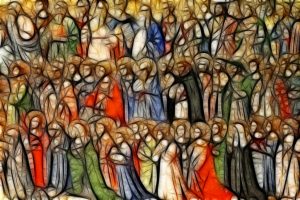
Prayers: in thanksgiving for the holy ones of God and in faith for his everlasting love and mercy.
For Abraham and Sarah, our ancestors in faith,
and all who journey into the unknown trusting God’s promises:
For Jacob, deceitful younger brother, yet chosen by God,
the father of all who are called not by virtue but by grace:
For Moses the lawgiver and Aaron the priest,
and all who lead God’s people to freedom and newness of life:
For Isaiah, John the Baptist and all the prophets,
and all who speak the truth without counting the cost:
For Mary the Virgin, the mother of our Lord and God,
and all who obey God’s call without question:
For Andrew and John and the first disciples,
and for all who forsake everything to follow Jesus:
For Stephen, Alban, Agnes, Lucy and the whole army of martyrs,
and all who have faced death for love of Christ:
For Columba and Aidan, for Ninian and Patrick,
and for all who have carried the gospel to this and other lands:
For David, Cuthbert and Francis,
and for all who live and teach the love of God:
For the martyrs and peacemakers of our own time,
who shine as lights in the darkness:
For all the unsung heroes and heroines of our faith,
whose names are known to God alone:
For all those in our own lives
who have revealed to us the love of God
and shown to us the way of holiness:
Thanks be to God.
In the silence of your hearts, name those whom you have loved but see no longer.
Jesus said, “This is the will of him that sent me,
that I should lose nothing of all that he has given me,
and I will raise them up at the last day.”
Lord God, creator of all,
you have made us creatures of this earth,
but have also promised us a share in life eternal.
According to your promises,
may all who have died in the peace of Christ
come with your saints to the joys of your kingdom,
where there will be neither sorrow nor pain,
but life everlasting.
Amen.
|
|









 We know that that is true, in the sense that it is factual. To call a rose a table doesn’t suddenly make it a table. But we also know the importance of names. Parents agonise over what to call their children. There are hundreds and hundreds of websites out there with millions of names listed to help them choose. You can take tests and questionnaires to find the perfect name for your baby. It’s generally the second question asked of parents to be, after what the gender is, “have you chosen a name”. Because in that we think we can grasp something of the (still yet unborn) child’s identity. The name tells us a story, gives us a glimpse of their future.
We know that that is true, in the sense that it is factual. To call a rose a table doesn’t suddenly make it a table. But we also know the importance of names. Parents agonise over what to call their children. There are hundreds and hundreds of websites out there with millions of names listed to help them choose. You can take tests and questionnaires to find the perfect name for your baby. It’s generally the second question asked of parents to be, after what the gender is, “have you chosen a name”. Because in that we think we can grasp something of the (still yet unborn) child’s identity. The name tells us a story, gives us a glimpse of their future. Somehow that name made its way into common parlance as an expletive and that has only served to cheapen something which should be holy and awe-inspiring. We can easily forget the meaning and the one to whom it belongs and throw “Jesus” around like it’s “Jo” “Jack” or “Jane”. There are two contemplative prayers which I use where saying the name of Jesus, though not really the primary function of the prayer, has become a very powerful spiritual practice for me. One is the Jesus prayer (“Lord Jesus Christ, Son of God, have mercy on me a sinner”) and the other is the rosary (“Hail Mary full grace, the Lord is with thee…blessed is the fruit of thy womb Jesus”). It’s declaratory and worshipful, humbling and hopeful, to say the name of Jesus in prayer.
Somehow that name made its way into common parlance as an expletive and that has only served to cheapen something which should be holy and awe-inspiring. We can easily forget the meaning and the one to whom it belongs and throw “Jesus” around like it’s “Jo” “Jack” or “Jane”. There are two contemplative prayers which I use where saying the name of Jesus, though not really the primary function of the prayer, has become a very powerful spiritual practice for me. One is the Jesus prayer (“Lord Jesus Christ, Son of God, have mercy on me a sinner”) and the other is the rosary (“Hail Mary full grace, the Lord is with thee…blessed is the fruit of thy womb Jesus”). It’s declaratory and worshipful, humbling and hopeful, to say the name of Jesus in prayer.


 Nerys writes: I wonder if you are ready for Christmas? Are there things that are still to be done? Is there anything that you are putting off until after Christmas – perhaps something that really needs to be done now? Most of us tend to put things off thinking, mañana, tomorrow … Sometimes it’s because we are too busy, or we have other priorities, or perhaps we don’t really want to face whatever it is. In today’s Old Testament reading, Isaiah 7.10-16, King Ahaz did not want to face what was looming, and when God offered him a sign, he justified his reluctance by saying that he didn’t want to put God to the test. Little did he know just how important God’s sign would become, not just for himself but for the whole world …
Nerys writes: I wonder if you are ready for Christmas? Are there things that are still to be done? Is there anything that you are putting off until after Christmas – perhaps something that really needs to be done now? Most of us tend to put things off thinking, mañana, tomorrow … Sometimes it’s because we are too busy, or we have other priorities, or perhaps we don’t really want to face whatever it is. In today’s Old Testament reading, Isaiah 7.10-16, King Ahaz did not want to face what was looming, and when God offered him a sign, he justified his reluctance by saying that he didn’t want to put God to the test. Little did he know just how important God’s sign would become, not just for himself but for the whole world …




 Our candle today represents joy. It comes from the first word of the introit for today in the Latin Mass: Gaudete in Domino semper, Rejoice in the Lord always. Even as we question, even as we doubt, we can still rejoice, like Mary who announced that the Mighty one has done great things in lifting up the lowly, filling the hungry with good things, and sending the rich away empty. This is the advent of heaven, which breaks in unexpectedly. God’s help and hope has no limits, if only we have eyes to see. “Everlasting joy shall be upon their heads; they shall obtain joy and gladness, and sorrow and sighing shall flee away”.
Our candle today represents joy. It comes from the first word of the introit for today in the Latin Mass: Gaudete in Domino semper, Rejoice in the Lord always. Even as we question, even as we doubt, we can still rejoice, like Mary who announced that the Mighty one has done great things in lifting up the lowly, filling the hungry with good things, and sending the rich away empty. This is the advent of heaven, which breaks in unexpectedly. God’s help and hope has no limits, if only we have eyes to see. “Everlasting joy shall be upon their heads; they shall obtain joy and gladness, and sorrow and sighing shall flee away”.



















